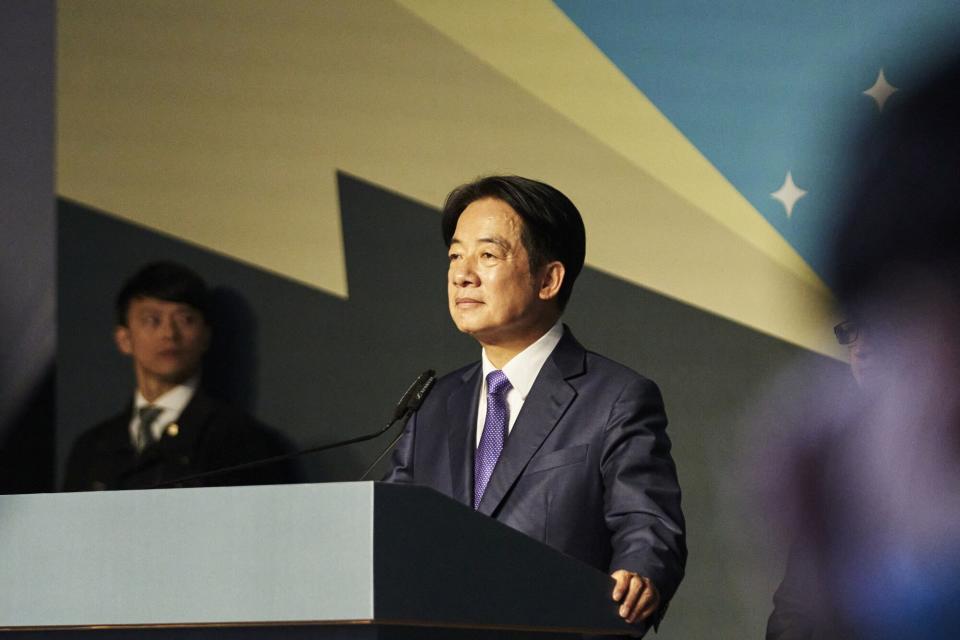China Steps Up Taiwan Isolation After Election, Peeling Off Ally
(Bloomberg) -- One of Taiwan’s last diplomatic allies severed relations with the island and switched its alliance to China, after the global chip hub elected a new leader Beijing views as “separatist.”
Most Read from Bloomberg
Trump Scores Easy Win in Iowa With DeSantis a Distant Second
Iowa Latest: Biden Calls Trump ‘Clear Frontrunner’ After Win
What Is Disease X? How Scientists Are Preparing for the Next Pandemic
Apple to Pull Blood-Oxygen Tool From Watches to Avoid US Ban If Appeal Fails
The government of Nauru, a tiny Pacific Island of 13,000 people, announced it will cut “diplomatic relations with Taiwan as of this day,” in a statement posted to its official Facebook page on Monday. It also vowed to stop developing “official exchanges with Taiwan.”
“This is retaliation for democratic values and a blatant challenge to the international order,” Taiwan’s Deputy Foreign Minister Tien Chung-kwang said at briefing in Taipei, adding that the self-ruled island was also officially cutting ties.
Nauru had made significant financial requests in the run-up to the decision, Tien added, while declining to provide figures. “China is using every possible way to suppress Taiwan, including money and diplomacy,” the minster said.
China has been peeling off Taipei’s allies in recent years, as it ramps up military, economic and diplomatic pressure on the island it considers a breakaway territory. Taiwan elected the Democratic Progressive Party’s Lai Ching-te as its next leader on Saturday, in an energetic show of democratic freedoms that defied Beijing’s warnings.
Taiwan now has official diplomatic relations with 12 nations, mostly around the Caribbean. That cuts the number of friends that can take up issues for the self-run island in international forums like the United Nations, where it lacks a seat.
“It is an indignity that Beijing has heaped on Taiwan in response to the DPP victory,” said Drew Thompson, a former Pentagon official and a senior fellow at the Lee Kuan Yew School of Public Policy in Singapore.
“But it is not a meaningful or impactful one, just a vindictive response revealing Beijing’s frustration with the limits of its influence,” he added.
President Xi Jinping’s government initially displayed a low-key response to the US-friendly candidate’s win, skipping a large show of military force. The two parties that favored restarting dialogue with Beijing won 60% of the tally, but their proposed alliance crumbled in November splitting that vote.
Relations between Nauru and Taiwan had until recently seemed solid, with then President Russ Kun in 2023 calling at the United Nations for Taipei to resume its membership of that international decision-making body. A change in power last year, however, gave Beijing a window.
There had been indications that the new leader was looking for a greater contribution from Taiwan since coming to power in October, said Meg Keen, director of the Lowy Institute’s Pacific Island Program.
“China has deeper pockets than Taiwan, and bigger markets, so they have more to offer these small countries,” she added.
Taiwan’s foreign ministry said Nauru’s decision was “sudden” given the country congratulated Lai for his victory. The last nation to switch diplomatic relations to Beijing from Taipei was Honduras in 2023. Before that, Nicaragua jumped ship in 2021 and the Pacific Island of Kiribati did so in 2019.
Chinese Foreign Ministry spokeswoman Mao Ning defended the timing of the announcement at a regular briefing on Monday in Beijing. “When do you think we should release the information?” she said. “Of course, we release the information after the election.”
The news came as former US officials met with Lai in Taipei, the type of meeting that frustrates China. Washington usually sends such a delegation after presidential elections in Taiwan, which gets much of its diplomatic and military support from the US.
“We will continue safeguarding the peace and stability across the Taiwan Strait,” Lai said as he met with former National Security Advisor Stephen Hadley, ex-Deputy Secretary of State James Steinberg and the top American liaison to Taiwan, Laura Rosenberger.
After the election, President Joe Biden reiterated the US stance that it does not support independence for Taiwan, a comment likely aimed at easing China’s concerns.
--With assistance from Colum Murphy, Ben Westcott and Martin Ritchie.
(Updates with details throughout.)
Most Read from Bloomberg Businessweek
Trumponomics 2.0: What to Expect If Trump Wins the 2024 Election
Kim Kardashian’s Skims Isn’t the Only Celebrity Brand to Watch
©2024 Bloomberg L.P.




